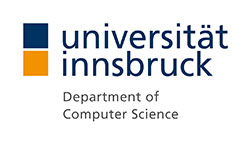Spreading excellence and disseminating the cutting edge results of our research and development efforts is crucial to our institute. Check for our educational offers for Bachelor, Master and PhD studies at the University of Innsbruck!
Development of a Thunderbird extension for Semantic eMail Adressing
| Attachment | Size |
|---|---|
| 764.52 KB |
Nowaday, almost everyone is using eMail as a tool for communication and collaboration everyday. Especially in a business setting eMail became extremely important and a major means for information exchange. However, for efficient communication across highly dynamic groups of people (e.g. a team working over long time on some product and respective updates or ad-hoc working group) current tools are non-optimal. The primary supporting means for managing such groups are mailing lists, which are manually administrated. In particular, the management of highly groups and respective lists are overly complex. Identification of people that have to be addressed is time-consuming and error-prone and not integrated with any other applications. In order to achieve the latter, a knowledge-based approach is suitable, e.g. the creation of a knowledge layer that represents, e.g. people, their current tasks, responsibilities, and roles. Such an explicit representation can be done by means of an ontology. A respective reasoner then allows applications to exploit and access (explicit and implicit) knowledge from this knowledge base.
Recently, Semantic eMail Adressing [1] has been proposed as a knowledge-based solution to the outlined problem. Essentially, Semantic eMail Adresses are logical (declarative) descriptions of recipients rather than static lists of strings. Therefore, they allow to sent (with the same description) eMails to highly dynamic groups of people and at the same time ensure, that the "right" people (at this specific moment in time) are addressed. Therefore Semantic eMails Adresses are stable, whereas the group might change very frequently. Moreover, they can be stored and shared with others, while keeping the same desireable property.
Thunderbird is a popular and extensible eMail client. It allows to add arbitrary functionality (esp. related to eMail) in a dynamic way.
The purpose of this project is to write an extension of Thunderbird, that extends Thunderbird by the possibility to
- Specify Semantic eMail Adresses
- Resolve Semantic eMail Adresses during runtime
The specification of Semantic eMail Adresses is based on ontologies (domain models) that captures tasks and roles of people. Therefore, the work includes the specification and/or adaption of small ontologies.
The resolution of Semantic eMail Adresses will be based on an existing reasoner, i.e. no reasoner has to be developed for this project.
A prototype has to be developed (preferably in Java). It should be structured in a way that allows to reuse most of the code to derive plugins for other eMail clients.
[1] Michael Kassoff, Charles Petrie, Lee-Ming Zen, and Michael Genesereth,
"Semantic Email Addressing: Sending
Email to People, Not Strings,"
AAAI 2006 Fall Symposium on Integrating Reasoning into Everyday Applications
Contact person in charge.

